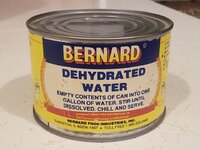You are using an out of date browser. It may not display this or other websites correctly.
You should upgrade or use an alternative browser.
You should upgrade or use an alternative browser.
Is water wet?
- Thread starter Ktwulph
- Start date
R
RGT
Guest
^ thisNo, liquid water itself is not wet, it makes other objectives wet because the liquid sticks on the surface - what we describe as wet.
Oldest beginner question in any chemistry course I think.
R
Ruben
Guest
In its liquid form water is wet.
Source:

 www.merriam-webster.com
www.merriam-webster.com
Source:

Definition of WET
consisting of, containing, covered with, or soaked with liquid (such as water); containing appreciable quantities of readily condensable hydrocarbons; rainy… See the full definition
stumpy bill
Tourist
Is dry ice wet?
shameless_dawg
Lurker
Water is not wet. It wets other things. And dry ice is not wet. It is sublime.
BentoBox69
Citizen of Zooville
Since the concept of being "wet" is an observation due to a liquid stimuli wouldn't that mean for something to be "wet it must be touched by something to recognize that it is wet? In other words since water is not conscious like we are it cant be wet until we (the conscious) touch it.
TropicalCritter
Tourist
The body composition of German Shepherds may have very high levels of water because they get a lot of people wet.
I include myself in it ??
I include myself in it ??
EuropeanMan
Tourist
It is
Goattobeloved
Esteemed Citizen of ZV
Randomly987
Tourist
Depending on temperature, it is or it isn't.
But frozen water is ice, so?!?
I guess it is.
But frozen water is ice, so?!?
I guess it is.
x51
Citizen of Zooville
Water is not wet because wetness arises from the interaction between a liquid and a solid surface. In other words, wetness is a property that occurs when water or another liquid comes into contact with a solid object.
And as such water nor any other liquid in and of themselves alone can not be wet .
And as such water nor any other liquid in and of themselves alone can not be wet .

Yuri1944
Citizen of Zooville
Based physical chemistry affirmationNo, liquid water itself is not wet, it makes other objectives wet because the liquid sticks on the surface - what we describe as wet.
Oldest beginner question in any chemistry course I think.
x51
Citizen of Zooville
well since water is not wet technically no , but once it comes into contact with water , it , itself would become wet . so i guess at that point you would have to keep the object away from itself ...... lol"Don't let this touch anything wet."
Should I keep it away from water?
Yuri1944
Citizen of Zooville
Naohhhh, it's a basic ideaSo I should wash my 10 pound block of sodium in the shower with me?
Yuri1944
Citizen of Zooville
That sounds quite a hassle. I'm not personally fond of working with dioxane or sodium...Sounds like it'll be a blast! (I was up way way too late purifying 1, 4, dioxane, ironically the sole purpose of making it was to clean my stock of sodium, which will be used to make more sodium, life can be painfully circular at times when you think about it)
x51
Citizen of Zooville
oh it would be one hell of a blast indeed lolSounds like it'll be a blast!
horrifying-existence
Lurker
YESSS, THIS ^^No, liquid water itself is not wet, it makes other objectives wet because the liquid sticks on the surface - what we describe as wet.
Oldest beginner question in any chemistry course I think.
"Objectives"?No, liquid water itself is not wet, it makes other objectives wet because the liquid sticks on the surface - what we describe as wet.
Oldest beginner question in any chemistry course I think.
I think you meant to type, "objects."


